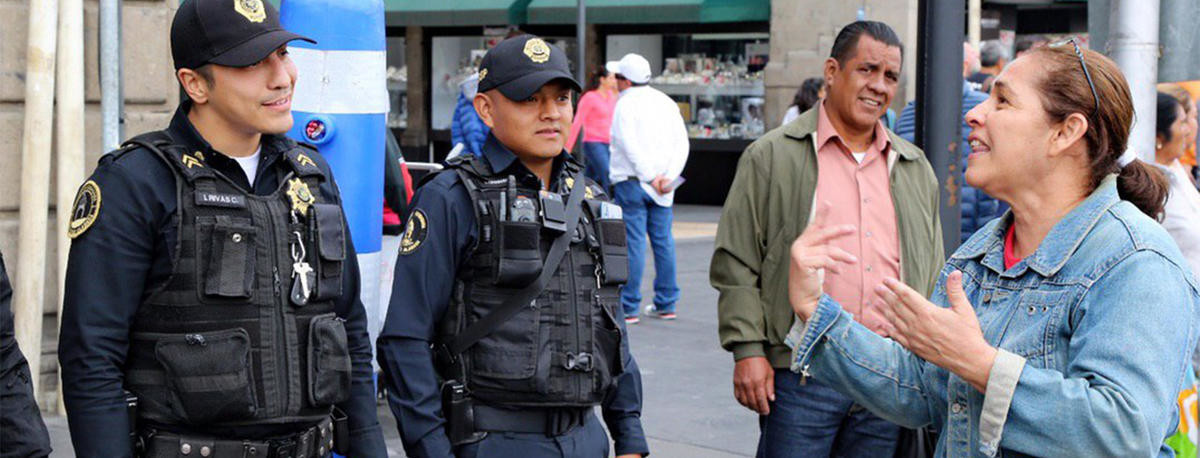Building More Effective Police Forces in Mexico
Abstract
Security policymakers at the municipal and national levels in Mexico are incorporating recent evidence into their training strategies for police officers.
Police forces in Mexico often lack legitimacy and trust from citizens, limiting their effectiveness at addressing crime and violence. To help address this, IPA Mexico and researcher Rodrigo Canales have collaborated in a series of research and evidence-based policy advisory activities called “Building Effective, Resilient, and Trusted Police Forces.” After a randomized evaluation found that a procedural justice training improved the behavior of officers in Mexico City, the police department decided to scale up the training to reach all of the city’s officers. In three cities, IPA has also supported a train-the-trainers program, building capacity for police departments to include procedural justice either as a standalone training or as part of their basic training. Procedural justice has also been integrated as a strategy to build citizen trust in Mexico City, as part of the city's homicide prevention program Alto al Fuego, and in Cancún, Chihuahua, Saltillo, San Nicolás and Morelia as part of their community policing programs.

The Challenge
Crime, violence, and a weak rule of law are among some of Latin America’s most pressing issues—particularly in Mexico, where citizens list insecurity as a top concern.
Effective police forces can help to address these issues, but citizen perceptions of police forces' reliability in Mexico are typically negative. Public insecurity and widespread mistrust of police among citizens is associated with decreased police legitimacy, which has negative consequences for effective policing.
Research has demonstrated that when police officers interact with citizens following principles of procedural justice, citizens leave those interactions—even contentious ones—with an increased perception of trust in the police, which enhances legitimacy and efficacy. The question remains, however, as to how a police force can institutionalize procedural justice as an organizational capability.
The Evidence
Since 2017, IPA Mexico has collaborated with researcher Rodrigo Canales on a project called "Building Effective, Resilient, and Trusted Police Forces." The project began with an evaluation of a procedural justice training for officers in Mexico City and has since expanded to include several lines of research and policy advisory with local and national governments in Mexico.
In the project's initial evaluation, the research team worked with the Ministry of Public Security of Mexico City to evaluate the impact of a procedural justice training for police officers. Procedural justice, a framework that originally gained prominence in U.S. criminology in the 1990s, specifies four principles that determine whether citizens will perceive their authorities as legitimate: voice, neutrality, dignity and respect, and trustworthiness.
Working together, the Ministry and the research team adapted the procedural justice model to the Mexican context and developed a training program (and accompanying manuals) to encourage line officers and commanders to apply the principles of procedural justice to their work. The study measured line officers’ perceptions of the importance of procedural justice, whether they internalized procedural justice concepts, and their actual behavioral change in the streets by conducting a “mystery shopper” study that sent actors to simulate citizen interactions with officers.
Preliminary results suggest that procedural justice training had significant impacts on the perceptions and behavior of individual line officers. Across all measures, researchers estimate that the training produced effects large enough to bring an officer whose performance with regards to procedural justice began in the bottom quartile of the distribution to the median.
The project has since expanded to encompass more components, including a policy advisory project to reform the use of the Compstat tool in Mexico City; an ongoing randomized evaluation of a community policing intervention in four municipalities; and a randomized evaluation of the "Ceasefire" intervention to reduce gang violence in Mexico City.
The Impact
Shortly after the evaluation of procedural justice training concluded, the project team presented the results to decision-makers in Mexico City's Ministry of Public Security. After seeing the results, the Ministry decided to scale up the procedural justice training to reach all of its approximately 80,000 officers.
Since 2019, over 1,500 police officers in 28 cities in Mexico have received procedural justice training. In three cities, IPA has also supported a train-the-trainers program, building capacity for police departments to include procedural justice either as a standalone training or as part of their basic training. Procedural justice has also been integrated as a strategy to build citizen trust in Mexico City, as part of the city's homicide prevention program Alto al Fuego, and in Cancún, Chihuahua, Saltillo, San Nicolás and Morelia as part of their community policing programs.











